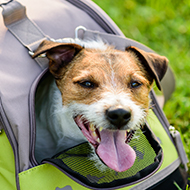
Owners must acquire health certificate from their vet before travel
The UK has been granted 'Part 2' listed status under the EU Pet Travel Scheme, meaning that dog, cat and ferret owners will have to follow new rules when travelling to the EU or Northern Ireland with their pet.
From the 1 January 2021, people travelling from Britain with pets or assistance dogs must acquire an animal health certificate (AHC) no more than ten days before they travel, instead of a pet passport.
Owners will also have to ensure their pet is microchipped and that it is vaccinated against rabies. Guidance also states that owners must wait 21 days after the primary vaccination before travel. If they are travelling to a tapeworm free country, dogs must be treated against tapeworm 24-120 hours before landing.
Pets and assistance dogs will also need to enter the EU through a travellers’ point of entry (TPE), which includes all the major French ports such as Calais, Caen and Dunkirk.
These rules will also apply for travel with pets or assistance dogs from Britain to Northern Ireland. However, the UK Government states that it is working with the Department of Agriculture, Environment and Rural Affairs (DAERA) in Northern Ireland to develop an enforcement approach which supports pet owners as they adjust to these changes.
Defra has confirmed that there will be no change to current health preparations or documents for pets entering Britain from the EU or Northern Ireland from 1 January 2021.
Owners are advised to check the government website for guidelines.
Moving forward, the government confirmed it will continue to press the European commission to secure 'Part 1' listed status, stating that the UK meets all the requirements for it.



 The latest
The latest